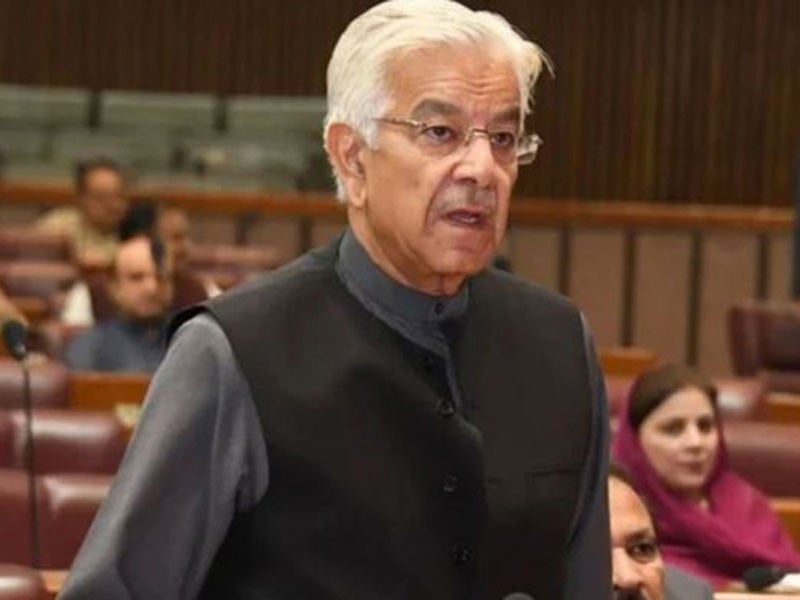Defence Minister Khawaja Asif stated on Saturday that the series of events stemming from the May 9 unrest will not conclude until those who orchestrated the violence are held accountable.
Reacting to military court rulings sentencing 25 individuals for their roles in the May 9 incidents, Asif emphasised the need for swift justice, citing examples from countries like the US and UK.
“The delay in verdicts emboldened the accused and their facilitators,” Asif said in a post on X, formerly Twitter. He also criticised the glorification of individuals involved in disrespecting martyrs and war heroes.
The defence minister highlighted that while perpetrators and on-ground participants have been apprehended, the planners of the “dark day” remain untouched by the law.
He stressed that until action is taken against such elements, encouraged by anti-state actors, the process of justice will remain incomplete.
Military court sentences 25 for May 9 riots: ISPR
Military courts have sentenced 25 civilians to prison terms ranging from two to 10 years for their role in violent attacks on military installations during nationwide riots in May 2023, the Inter-Services Public Relations (ISPR) said on Saturday.
According to the military’s media wing, the Field General Court Martial has sentenced 25 individuals in the first phase, following a thorough review of evidence and the completion of proper legal procedures.
“The convicted individuals were involved in attacks on key military sites, including Jinnah House, the General Headquarters (GHQ), and Pakistan Air Force Base Mianwali,” it said.
14 individuals received 10-year sentences of rigorous imprisonment, while the others were given shorter terms, the statement read.
The ISPR statement also highlighted the importance of addressing such actions, calling them an “unacceptable attempt of political terrorism to impose [a] perverted will through violence and coercion.”
The military’s media wing further detailed the events of May 9, describing them as a “dark chapter” in Pakistan’s history, marked by politically provoked violence and arson at several locations.
“Building on a sustained narrative of hate and lies,” the statement read, adding that “politically orchestrated attacks were carried out on the installations of the armed forces, including the desecration of the monuments of Shuhada.”
“These blatant acts of violence not only shocked the nation but also underscored the necessity of checking this unacceptable attempt of political terrorism to impose own perverted will through violence and coercion,” the ISPR noted.
The military’s media wing also condemned the actions as a direct assault on the country’s national security and stability.
Following the events of that “Black Day,” the military conducted detailed investigations, gathering irrefutable evidence to prosecute those involved. “Sequel to the events of this ‘Black Day,’ through meticulous investigations, irrefutable evidence was collected to legally prosecute the accused involved in the tragedy,” the statement noted.
Some of the cases were referred to the Field General Court Martial for trials, which proceeded according to legal procedures. The convicted individuals included those involved in the attack on Jinnah House, the General Headquarters (GHQ), and various other military sites.
In describing the significance of the verdicts, the ISPR referred to the sentences as an “important milestone” in delivering justice to the nation. “It is also a stark reminder to all those who are exploited by the vested interests and fall prey to their political propaganda and intoxicating lies, to never take law in their own hands ever in the future,” the statement concluded.
The details of the 25 convicted individuals are as follows:
- Jan Muhammad Khan (Jinnah House attack) – 10 years imprisonment
- Muhammad Imran Mehboob (Jinnah House attack) – 10 years imprisonment
- Raja Muhammad Ehsan (GHQ attack) – 10 years imprisonment
- Rehmatullah (Punjab Regimental Centre Mardan attack) – 10 years imprisonment
- Anwar Khan (PAF Base Mianwali attack) – 10 years imprisonment
- Muhammad Afaq Khan (Bannu Cantonment attack) – 9 years imprisonment
- Daud Khan (Chakdara Fort attack) – 7 years imprisonment
- Faheem Haider (Jinnah House attack) – 6 years imprisonment
- Zahid Khan (Multan Cantonment checkpoint attack) – 4 years imprisonment
- Yasir Nawaz (Punjab Regimental Centre Mardan attack) – 2 years imprisonment
- Abdul Hadi (Jinnah House attack) – 10 years imprisonment
- Ali Shan (Jinnah House attack) – 10 years imprisonment
- Daud Khan (Jinnah House attack) – 10 years imprisonment
- Umar Farooq (GHQ attack) – 10 years imprisonment
- Babar Jamal (PAF Base Mianwali attack) – 10 years imprisonment
- Muhammad Hashir Khan (Jinnah House attack) – 6 years imprisonment
- Muhammad Ashiq Khan (Jinnah House attack) – 4 years imprisonment
- Khurram Shehzad (Multan Cantonment checkpoint attack) – 3 years imprisonment
- Muhammad Bilawal (Jinnah House attack) – 2 years imprisonment
- Saeed Alam (Punjab Regimental Centre Mardan attack) – 2 years imprisonment
- Laiq Ahmad (ISI Office Faisalabad attack) – 2 years imprisonment
- Ali Iftikhar (Jinnah House attack) – 10 years imprisonment
- Zia Ur Rehman (Jinnah House attack) – 10 years imprisonment
- Adnan Ahmad (Punjab Regimental Centre Mardan attack) – 10 years imprisonment
- Shakir Ullah (Punjab Regimental Centre Mardan attack) – 10 years imprisonment







